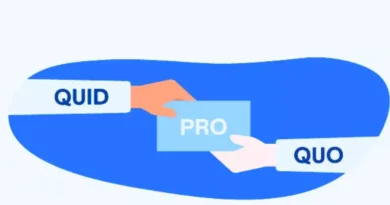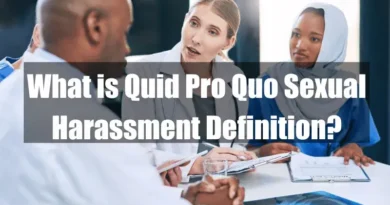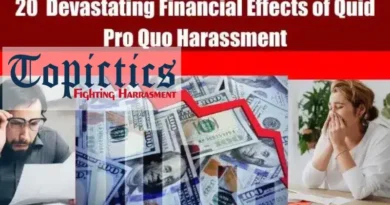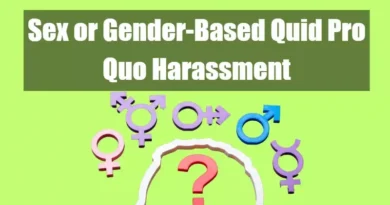Is Quid Pro Quo in the US Constitution?
Takeaways
| Key Points |
|---|
| The term “quid pro quo” is not explicitly mentioned in the U.S. Constitution. However, the concept is strongly related to anti-corruption measures in U.S. law. |
| Quid pro quo, meaning “something for something,” is central to laws against bribery and corruption. For example, federal laws criminalize any exchange where an official takes a specific action in return for something of value, which is considered a bribe. |
| This type of corrupt behavior is regulated through statutes like 18 U.S.C. §666, which penalizes both offering and accepting bribes. |
| While the Constitution does not explicitly mention ‘quid pro quo,’ the concept is central to many legal rulings on corruption. For instance, in Supreme Court decisions on campaign finance, concerns about quid pro quo corruption—where political contributions are exchanged for favors or actions—play a key role in upholding limits on donations. |
Introduction to Quid Pro Quo
Quid pro quo” is a Latin term that translates to “something for something.” It generally describes an arrangement where something of value is exchanged for a specific action or benefit in return. In U.S. law, this term is most often associated with corruption and bribery, where public officials or other individuals in positions of power receive something valuable in return for favors or special treatment. While the U.S. Constitution does not explicitly mention “quid pro quo,” the concept is central to several legal and ethical principles, particularly those addressing corruption, official duties, and political financial exchanges.
The Constitutional Foundation for Anti-Corruption Measures
The Constitution does not directly mention quid pro quo, but several clauses address corruption and the abuse of public power. Article II, Section 4 establishes grounds for impeaching the President, Vice President, and other federal officers for “treason, bribery, or other high crimes and misdemeanors.
Bribery, which involves quid pro quo, is explicitly identified as an impeachable offense, emphasizing the Founders’ concerns about corruption in government. While all bribery involves quid pro quo (an exchange of something for something else), not every quid pro quo constitutes bribery.

Additionally, the “Emoluments Clauses” (in Article I, Section 9, and Article II, Section 1) prevent federal officials from accepting payments or gifts from foreign governments or entities without congressional approval. These clauses are designed to prevent undue foreign influence on federal officials by prohibiting the acceptance of gifts, payments, or other benefits without congressional approval. While not explicitly about quid pro quo, these clauses aim to avoid situations where officials could be swayed to offer favorable treatment in return for financial or other benefits.
Federal Anti-Corruption Laws and Quid Pro Quo
Federal law extensively addresses quid pro quo arrangements, particularly in anti-corruption statutes. The federal bribery statute (18 U.S.C. § 201) criminalizes the act of offering, giving, or receiving something of value in exchange for an official act. This statute is key in combating bribery and corruption involving public officials, ensuring that officials perform their duties free from external influence.
Federal anti-bribery laws make it illegal for public officials to take actions—such as awarding contracts, changing regulations, or influencing legislation—in return for personal gain. These statutes protect the integrity of public office by criminalizing quid pro quo arrangements that could undermine public trust in government.
Quid Pro Quo and Campaign Finance

In campaign finance, concerns about quid pro quo revolve around the potential for large political donations to influence politicians. The core issue is whether donors receive special treatment in return for their financial support, which would constitute quid pro quo corruption. Campaign finance laws seek to prevent this by limiting contributions and requiring transparency.
Donors are legally allowed to contribute to political campaigns, but there are strict regulations on how much they can give and what politicians can accept. The intention is to prevent a situation where a politician provides favors or influences policy in exchange for financial support. However, proving quid pro quo in campaign finance is difficult because it requires evidence of a direct exchange—such as a politician taking specific action in return for a donation.
Challenges in Proving Quid Pro Quo
In legal cases involving quid pro quo corruption, proving the existence of an explicit exchange is often the biggest challenge. To establish that a quid pro quo occurred, there must be clear evidence that a public official received something of value specifically in exchange for a particular action. Without this direct link, prosecuting bribery or corruption cases can be difficult under federal law.
In many instances, public officials may accept campaign contributions or gifts without explicitly promising to take action in return. These situations can raise ethical concerns but do not always meet the legal standard for quid pro quo corruption. The difficulty of proving such arrangements often means that accusations of corruption may not lead to legal consequences unless the exchange is clearly documented.
Conclusion: Quid Pro Quo in the Constitutional Context
Although the U.S. Constitution does not explicitly mention quid pro quo, the concept is deeply embedded in the principles that guide federal anti-corruption efforts. While the U.S. Constitution establishes broad ethical principles that public officials must adhere to, specific federal laws, such as 18 U.S.C. § 201, explicitly prohibit bribery and corrupt exchanges involving personal gain. The challenge lies in proving these arrangements and ensuring that public officials are held to high ethical standards without unduly limiting political speech or participation.
The balance between preventing corruption and protecting free speech, especially in campaign finance, continues to evolve as courts and lawmakers address the complexities of money in politics. However, the foundational principle remains: public office should not be used for personal gain, and any quid pro quo arrangements that threaten this principle are subject to legal scrutiny under both the Constitution and federal law.
FAQ
What is the legal definition of quid pro quo in U.S. constitutional law?
In U.S. constitutional law, quid pro quo refers to an explicit agreement where a public official agrees to perform (or refrain from performing) an official act in exchange for something of value. This concept is central to bribery statutes, where the prosecution must demonstrate a clear exchange between the benefit received and the official action taken. The Supreme Court, in McDonnell v. United States, clarified that setting up a meeting, calling another public official, or hosting an event does not, by itself, qualify as an “official act” under federal bribery statutes. An “official act” involves a formal exercise of governmental power on a specific matter pending before a public official.
How does quid pro quo relate to the First Amendment and campaign finance laws?
The First Amendment protects free speech, including political contributions and expenditures. However, the government can impose certain limitations to prevent corruption or its appearance. In Buckley v. Valeo, the Supreme Court upheld contribution limits to candidates, reasoning that large contributions could lead to quid pro quo corruption. Conversely, the Court struck down expenditure limits, stating that independent expenditures pose less risk of quid pro quo arrangements since they are not coordinated with a candidate’s campaign.
What distinguishes a lawful contribution from an unlawful quid pro quo arrangement in campaign finance?
A lawful contribution is a donation made to a candidate or political committee without any expectation of a specific favor or action in return. An unlawful quid pro quo arrangement involves a direct exchange where a contribution is made with the explicit understanding that the candidate will perform a particular official act in return. The Supreme Court has emphasized that only contributions that lead to such explicit agreements constitute quid pro quo corruption.
How did the Citizens United v. FEC decision impact the understanding of quid pro quo in political spending?
In Citizens United v. Federal Election Commission, the Supreme Court held that corporate funding of independent political broadcasts in candidate elections cannot be limited under the First Amendment. The Court reasoned that independent expenditures, unlike direct contributions to candidates, do not pose a substantial risk of quid pro quo corruption because they are not coordinated with a candidate’s campaign. Therefore, restrictions on such expenditures were deemed unconstitutional.
What role does quid pro quo play in federal bribery statutes?
Federal bribery statutes criminalize the act of offering, giving, receiving, or soliciting something of value with the intent to influence or be influenced in the performance of an official act. A key element in these statutes is the existence of a quid pro quo arrangement, meaning there must be a clear agreement that the public official will perform a specific action in exchange for the benefit received. The Supreme Court’s decision in McDonnell v. United States narrowed the definition of “official act,” specifying that routine political activities do not meet this criterion without evidence of a concrete decision or action on a specific matter.
How does the concept of quid pro quo apply to allegations of political corruption?
In political corruption cases, quid pro quo refers to situations where a public official accepts something of value in exchange for performing a specific official act. Proving such corruption requires demonstrating that there was a clear agreement between the official and the benefactor linking the benefit to a particular governmental action. The absence of such an explicit agreement can make it challenging to prosecute under federal bribery laws.
Can implicit agreements constitute quid pro quo corruption?
Yes, implicit agreements can constitute quid pro quo corruption. The agreement between the public official and the benefactor does not need to be explicit; it can be inferred from the circumstances, including the pattern of interactions and the timing of the benefit and the official act. However, the evidence must show that both parties understood that the benefit was given in exchange for a specific official action.
How did the McDonnell v. United States decision redefine the scope of quid pro quo in bribery cases?
The McDonnell decision narrowed the scope of what constitutes an “official act” in bribery cases. The Supreme Court held that merely arranging meetings, talking to other officials, or organizing events do not qualify as official acts unless they are part of a formal exercise of governmental power on a specific matter. This ruling raised the bar for proving quid pro quo corruption, requiring clear evidence that a public official made a decision or took an action on a specific matter in exchange for something of value.
What is the difference between quid pro quo and gratuities in the context of public corruption?
Quid pro quo involves an exchange where a benefit is given in return for a specific official act. Conversely, gratuities are benefits given to a public official without a prior agreement, often as a reward for an official act that has already been performed. While both can be problematic, bribery laws typically require proof of a quid pro quo arrangement, whereas laws against gratuities address the acceptance of rewards without an explicit exchange agreement.
How does quid pro quo relate to the concept of “honest services fraud”?
Honest services fraud refers to schemes that deprive others of the intangible right to honest services, typically involving bribery or kickbacks. In this context, quid pro quo is central, as it involves an exchange where a public official’s actions are influenced by personal gain. The Supreme Court, in Skilling v. United States, clarified that the honest services statute applies specifically to bribery and kickback schemes, emphasizing the necessity of a quid pro quo arrangement for such offenses.
What constitutes an “explicit” versus “implicit” quid pro quo in legal terms?
An explicit quid pro quo involves a clear and direct agreement between parties where the terms of the exchange are openly stated. In contrast, an implicit quid pro quo is inferred from the circumstances without a direct verbal or written agreement. Courts have recognized that implicit agreements can still constitute bribery if the understanding between the parties is evident through their actions and the context of their interactions.
How has the “stream of benefits” theory been applied in quid pro quo cases?
The “stream of benefits” theory posits that a series of benefits provided to a public official can establish a quid pro quo relationship, even if no specific official act is directly linked to each benefit. This theory suggests that ongoing benefits are given with the expectation of favorable official actions over time. Courts have upheld convictions under this theory, recognizing that a continuous exchange of benefits and favors can constitute a corrupt relationship.
What defenses are commonly used against allegations of quid pro quo corruption?
Defendants in quid pro quo corruption cases often argue the absence of an explicit agreement, asserting that no direct exchange was agreed upon. They may also claim that the benefits provided were lawful gifts or campaign contributions without any intent to influence official actions. Additionally, some defendants contend that their actions did not constitute “official acts” as defined by law, referencing cases like McDonnell v. United States to support their position.
How does the concept of quid pro quo apply to lobbying activities?
Lobbying involves advocating for specific policies or decisions, often through providing information or persuasive arguments to public officials. While lobbying is a legal and regulated activity, it crosses into illegal quid pro quo corruption if there is an agreement where the lobbyist offers something of value in exchange for a specific official action. The distinction hinges on whether a corrupt agreement exists to exchange favors, which would constitute bribery rather than legitimate advocacy.
How have recent court decisions influenced the prosecution of quid pro quo arrangements?
Recent court decisions have refined the standards for prosecuting quid pro quo arrangements, particularly in defining what constitutes an “official act” and the nature of the agreement required. For instance, in McDonnell v. United States, the Supreme Court narrowed the definition of official acts, making it more challenging to prosecute certain actions as bribery. Additionally, in Percoco v. United States, the Court addressed the issue of private individuals exerting influence over government decisions, further clarifying the boundaries of honest services fraud.









